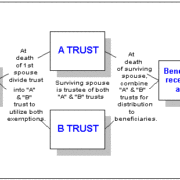What Is An Estate Plan, Part I – Death Documents?
Baron Law LLC, of Cleveland, Ohio, offers the following information on different components of an Estate Plan. To see what plan is best suited for your needs, contact Baron Law, LLC, Cleveland, Ohio.
By failing to prepare, you are preparing to fail.” Benjamin Franklin
Estate planning is a concept that many people know about, but few fully understand. To most, planning an estate consists simply of establishing a trust or drafting a will. Granted, these are indispensable aspects but such a limited view only serves to handicap successfully preparing for impending mortality.
Aside from ensuring assets pass to heirs and designated assets are freed from probate, a comprehensive estate plan can address a innumerable issues and provide effective solutions. Estate plans may be tailored to provide consistent income for retirement, guarantee responsible individuals are in place in moments of crisis, and medical wishes are communicated and followed. At the end of the day, however, an estate plan is simply a collection of legal documents. Each legal document has a specific purpose, possesses particular advantages, legal conventions, and applicable situations. Nevertheless, most estate plans do consist of a “core” of legal documents that are often advantageous to have regardless of health or financial situation. An estate attorney will draft the documents critical for a given situation but the following is a list of the “core” legal documents that will likely make up any estate plan.
The following consists of the typical documents within a traditional estate plan and is by no means exhaustive. Estate plans are reflective of their owners and are tailored specifically to that person or couple and the needs of surviving family members and financial interests. Again, an attorney is in the best position to advise and guide you on what the major estate planning concerns are and the best legal methods to take. This part of a two-part series discusses the estate planning documents largely concerned with providing instructions in the event of death.
Last Will and Testament
A last will and testament is the document most people associate with estate planning. The will memorializes the “last wishes” of a decedent and guides surviving friends and family on how to split up an estate according to the beneficiary designations and instructions present in the document. There are many types of wills and each one is drafted uniquely for the individual and their estate.
Though wills are specifically created, all share important uses and common characteristics. Again, wills bequest particular money and assets to chosen friends and family. Further, they provide for the how and when such bequests will take place. Some instruct money only to be given on an 18th birthday or only between children of a first marriage. Of critical importance, wills are also the primary method of election of guardians for minor children or disabled familial charges and executors of the estate. The provision of guardianship, a clear plan for property distribution post death, and executor election are the primary incentives for drafting a will. Addressing all is an utmost necessity for ensuring peace of mind for those left behind.
Wills, with some exceptions, all possess the same legal conventions controlling their creation. The point of these legal rules is to ensure the legitimacy of the will, the authenticity of the last wishes evidenced by the document, and protect estates from predatory practices and opportunists. Generally, a legally operative will must be in writing, signed by testator of sound mind, and witnessed by two competent witnesses.
While most estate assets are covered under a will, some assets are not. The following are an example common asset outside of a will, also sometimes referred to as non-testamentary assets: retirement accounts, life insurance proceeds, and property owned jointly with right of survivorship. Non-testamentary assets are normally bequeathed by independent beneficiary designations within the documents of creation or on associated accounts. As such, these assets normally do not undergo probate and are available to beneficiaries much quicker than assets passed via a will and the longer probate process. Distinguishing between testamentary and non-testamentary assets can have critical tax consequences for an estate, as such, please consult an estate attorney for guidance.
Wills are a mainstay and common tool for estate planning, however, its drafting can rapidly grow in complexity due to a convoluted family structure or an expansive estate. Again, an attorney should be retained to draft a will thus ensuring last wishes are effectively communicated and legally valid within a probate court. Failure to draft a will or an improperly drafted or implemented one may result in assets going to improper parties, an undesired executor administrating an estate, irresponsible or unknown guardians for minor children, or undue legal fees and court costs.
Guardianship Designations for Minor Children
A critical concern for most people with young children is, who is going to take care of my children if I’m not here? Ensuring that financially stable friends or family willing to raise children exist affords piece of mind to parents in the event of sudden or unexpected death. Also, proactively addressing guardianship lets parents pick like-minded guardians in regards to personal, lifestyle, or religious views so surviving children are still, at least partially, raised in the manner they desire.
The easiest way to designate a guardian is to name that person or persons in the last will and testament. Then upon death, if the children are not yet 18, a probate court in most situations will appoint the named individuals as guardians according to the specified instructions. A simple will guardian designation, however, may not be convenient or appropriate in certain situations. Family compositions often change, such as in divorce or estrangement, or previously nominated guardians pass away thus negating the express wishes within a will. As such, amending or redrafting a will every time a different guardian is preferable can be time consuming and expensive.
Another way, however, exists to appoint a guardian outside of a will. An independent writing, other than a durable power of attorney, signed, witnessed, notarized, and filed with the appropriate probate court, specifying an appropriate guardian, is sufficient to convey such responsibilities. This method is relatively inexpensive and affords more flexibility to concerned parents. This independent writing method is not meant to affect any other issue or provision within a last will and testament other than appointment of guardians in the event of death. Note, an attorney will be able to resolve and watch for any potential issues regarding contradictory guardianship designations in separate estate planning documents.
Unfortunately, not everyone is blessed with a stable home life or responsible extended family. As such, proper guardian designation documentation is important and alleviates stress for parents, especially within the context of debilitating disease or deteriorating health. Further, appropriate designation avoids the involvement of child services and the courts in determining custody, eliminates the prospect of child trauma and stress upon children and concerned family during transition, and ensures surviving children have no opportunity to become wards of the state.
Letter of Intent
The aforementioned documents taken together serve to mostly illustrate and communicate a decedent’s final wishes. Everything, however, is subject to interpretation. Take the phone game most people played as children for example. A message begins at one end of a chain and, through repetitive communication and subtle shifts in language and understanding, comes out at the end completely different than how it started. A letter of intent fills in any gaps in understanding and prevents manipulation, subtle or overt, of estate instructions.
A letter of intent is a simple document that provides comprehensive instructions for what the decedent views is the most critical information and desired outcomes of an estate plan. The letter, however, is an informal document that is not legally binding upon a probate court. That being said, courts generally rely on them during probate proceedings because there is no greater authority than a decedent’s own words. After all, the entire point of probate is to distribute estate assets as close to a decedent’s intent as possible after the fact. Common instructions within a letter of intent include: guardian designations for minor children, if not detailed in a last will and testament, specific methods for bequests, the location of assets, funeral details, and the locations of estranged family members or friends chosen as beneficiaries. A decedent’s letter of intent in an additional effort to eliminate any confusion or room for interpretation within an estate plan.
Further, a letter of intent may serve as an alternative to adding on to an existing will independent of a codicil. Again, the letter itself is not legally binding like a codicil would be but it is relatively inexpensive, quick, and may serve as a viable substitute in a crunch. In Ohio, codicils are governed by strict legal conventions while letters of intent are not. As such, letters may be the document of last resort in situations of impending mortality or incapacity. As most probate judges agree, something is better than nothing. Note, however, a letter of intent is never a substitute for a will. Always consult with an attorney regarding how to best utilize a letter of intent in conjunction with other estate planning documents.
Your last will and testament, guardianship designations, and letter of intent are all critical estate planning documents, however, taken together they only offer partial protection and primarily focus on providing instructions after death. In the next part of the series the estate documents of the living will, HIPPA authorization, and healthcare and durable powers of attorney, which concentrate on providing instructions during life, are explored. Taken together, all the documents explored during this series can provide comprehensive protection for the most critical issues of both life and death.
You don’t have to be rich to protect what you’ve spent a lifetime trying to build. To find out whether a trust is right for your family, take the one-minute questionnaire at www.DoIneedaTrust.com. There are a number of different trusts available and the choices are infinite. With every scenario, careful consideration of every trust planning strategy should be considered for the maximum asset protection and tax savings.
For more information, you can contact Mike Benjamin of Baron Law LLC at 216-573-3723. Baron Law LLC is a Cleveland, Ohio area law firm focusing on estate planning and elder law. Mike can also be reached at mike@baronlawcleveland.com.
Helping You and Your Loved Ones Plan for the Future.
About the author: Mike E. Benjamin, Esq.
Mike is a contracted attorney at Baron Law LLC who specializes in civil litigation, estate planning, and probate law. He is a member of the Westshore Bar Association, the Ohio State Bar Association, the Cleveland Metropolitan Bar Association, and the Federal Bar Association for the Northern District of Ohio. He can be reached at mike@baronlawcleveland.com.















